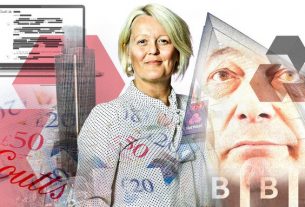British bankers are celebrating bumper bonuses set to exceed £4 billion while UK households struggle amidst the cost of living crisis.
The Bank of England (BoE) today announced inflation has hit a new 30-year high in January with consumer prices up 5.5% on the year. Surging prices for energy, clothing and footwear is behind the steepest spike in inflation since 1992, according to the Office for National Statistics (ONS).
Households are braced for more hits to their incomes with higher taxes, higher energy costs and even higher inflation – expected to climb beyond 7% this year – all on the horizon.
Bankers however, are toasting their bonuses in the City of London’s wineries and bars with the big four banks – HSBC, Barclays, Lloyds Banking Group and NatWest – expected to make more than £34 billion in profits this year, the highest since 2007. More than £4 billion is expected to go on bonuses for bankers, the Guardian reports.
Bankers bonuses ‘particularly obscene’ this year
“We have had quite the run on champagne – the poshest champagne we stock,” said a bartender who works near the headquarters of many of London’s banks. “They come here to celebrate when they get told their ‘number’ [bonus] – the numbers seem to have been particularly obscene this year.”
Workers elsewhere are not so fortunate and the Telegraph reports that someone earning £50,000 will be £1,400 poorer this year, even if they get a pay rise.
Bank of England governor Andrew Bailey – annual salary: £575,538 – garnered criticism last week for calling on workers not to ask for pay rises in order to control inflation. The Chartered Institute of Personnel and Development say the average wage will be up 3% this year, meaning workers will be far worse off, and not just because of rising inflation.
National Insurance is going up by 1.25% in April. Personal tax thresholds are frozen meaning more people will be in higher tax bands. Household bills are surging. Energy bills are going up by 54%. Mortgage rates are rising. Council tax is expected to be higher with the average Band D property likely to be charged almost £2,000. Petrol prices are climbing. And the Institute for Fiscal Studies said one million parents will lose child benefit payments this year.
Inflation stats
In January 2021 the consumer price inflation rate was 0.7%. The same rate for January 2022 is 5.5%.
Inflation for clothing is 6.3% on the year – the highest since ONS records began more than 30 years ago.
While the ONS report that flour and fresh fish are actually cheaper in 2022, the cost of food overall is up 4.3% – the highest rise in nearly 10 years. Oils and fats are up almost 16% with margarine and vegetable fats up by more than 33% compared with last year. Pasta has shot up almost 15%, slightly more than yoghurt and lamb which both increased by around an eighth.
The price of home maintenance materials is up 14% – the same as furniture which now costs 14% more than 12 months ago.




